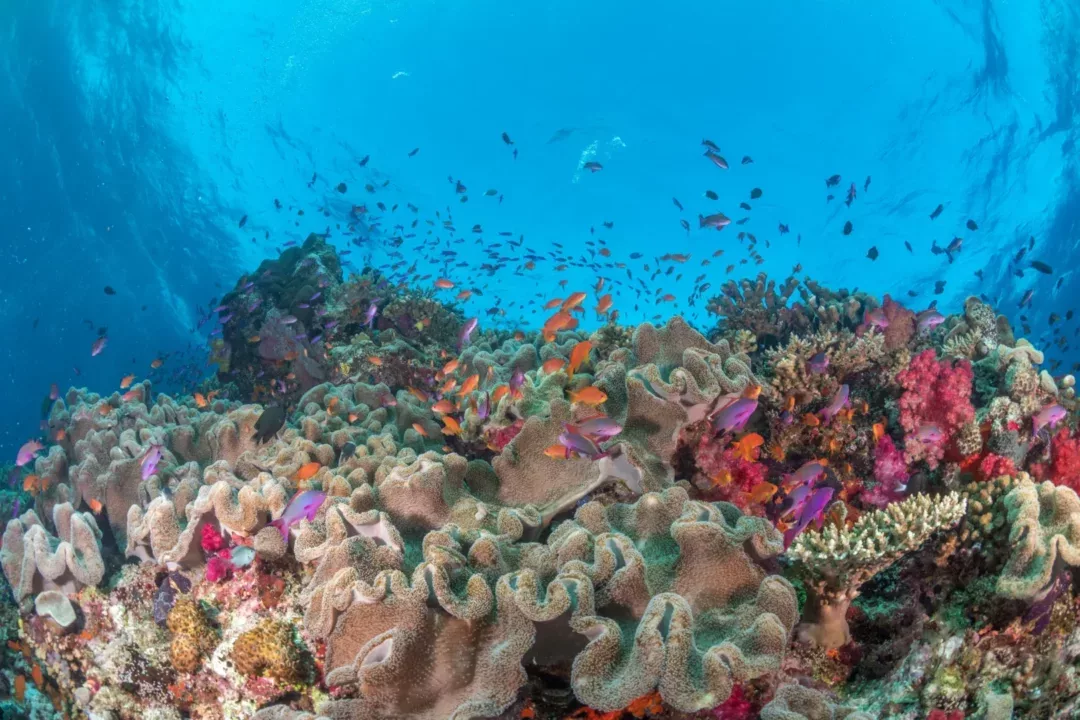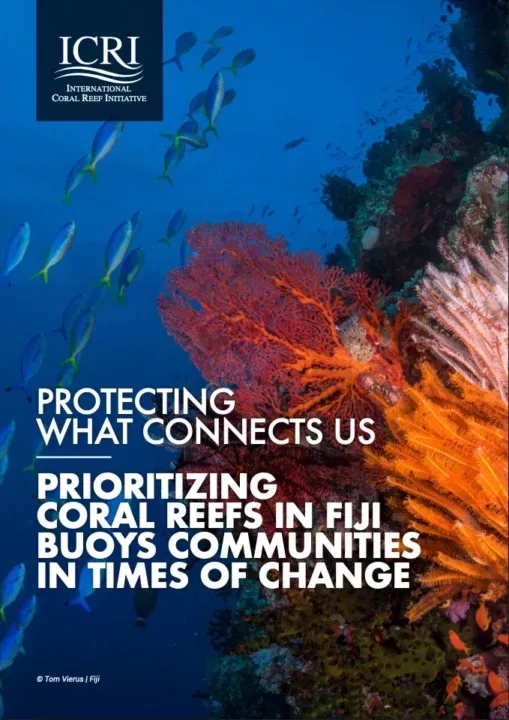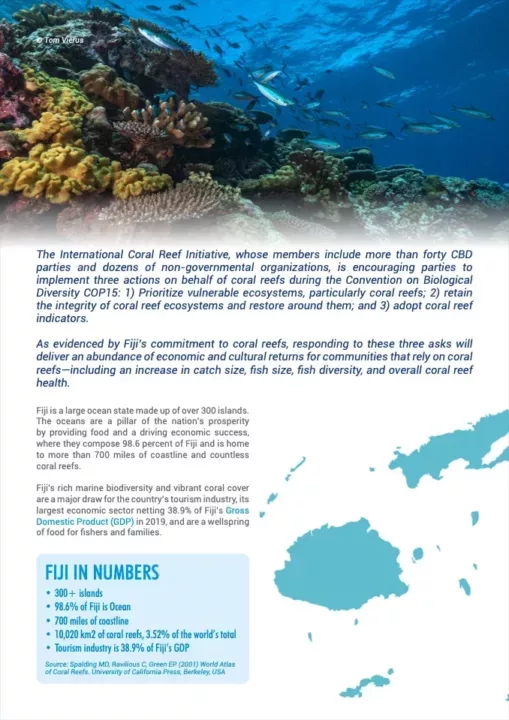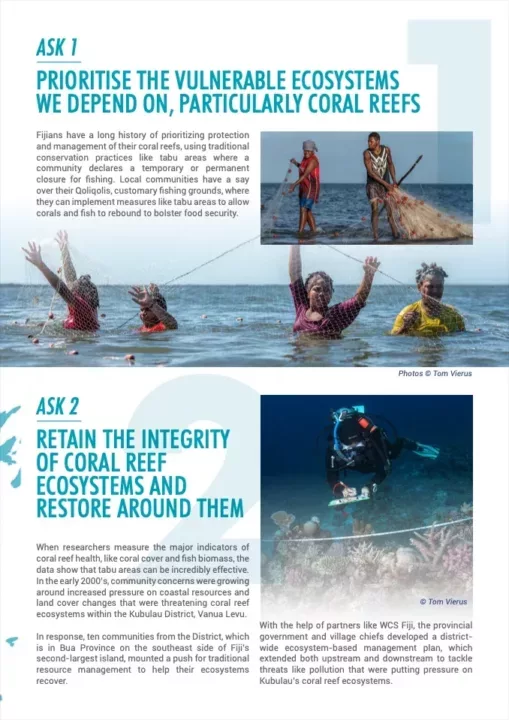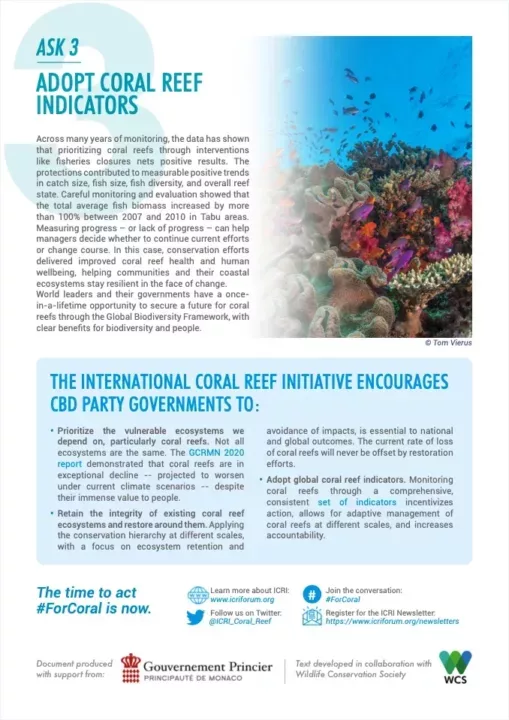Protecting what connects us | Prioritizing coral reefs in Fiji buoys communities in times of change
The International Coral Reef Initiative, whose members include more than forty CBD parties and dozens of non-governmental organizations, is encouraging parties to implement three actions on behalf of coral reefs during the Convention on Biological Diversity COP15: 1) Prioritize vulnerable ecosystems, particularly coral reefs; 2) retain the integrity of coral reef ecosystems and restore around them; and 3) adopt coral reef indicators.
As evidenced by Fiji’s commitment to coral reefs, responding to these three asks will deliver an abundance of economic and cultural returns for communities that rely on coral reefs—including an increase in catch size, fish size, fish diversity, and overall coral reef health.
Fiji is a large ocean state made up of over 300 islands. The oceans are a pillar of the nation’s prosperity by providing food and driving economic success, where they compose 98.6 percent of Fiji which is home to more than 700 miles of coastline and countless coral reefs.
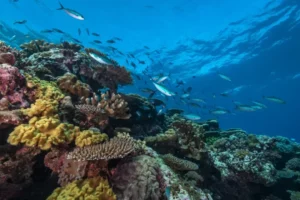
Fiji’s rich marine biodiversity and vibrant coral cover are a major draw for the country’s tourism industry, its largest economic sector netting 38.9% of Fiji’s Gross Domestic Product (GDP) in 2019, and are a wellspring of food for fishers and families.
Ask 1: Prioritise the vulnerable ecosystems we depend on, particularly coral reefs
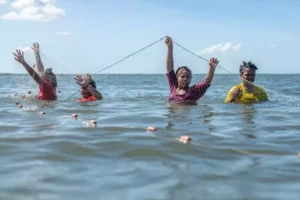
Fijians have a long history of prioritizing protection and management of their coral reefs, using traditional conservation practices like tabu areas where a community declares a temporary or permanent closure for fishing. Local communities have a say over their Qoliqolis, customary fishing grounds, where they can implement measures like tabu areas to allow corals and fish to rebound to bolster food security.
Ask 2: Retain the integrity of coral reef ecosystems and restore around them
When researchers measure the major indicators of coral reef health, like coral cover and fish biomass, the data show that tabu areas can be incredibly effective.
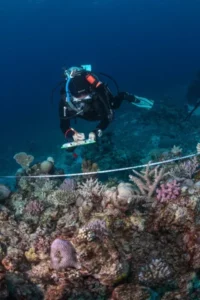
In the early 2000’s, community concerns were growing around increased pressure on coastal resources and land cover changes that were threatening coral reef ecosystems within the Kubulau District, Vanua Levu. In response, ten communities from the District, which is in Bua Province on the southeast side of Fiji’s second-largest island, mounted a push for traditional resource management to help their ecosystems recover. With the help of partners like WCS Fiji, the provincial government and village chiefs developed a district-wide ecosystem-based management plan, which extended both upstream and downstream to tackle threats like pollution that were putting pressure on Kubulau’s coral reef ecosystems.
Ask 3: Adopt coral reef indicators
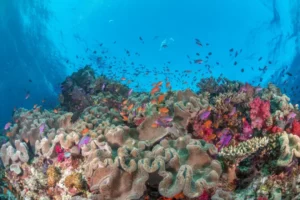
Across many years of monitoring, the data has shown that prioritizing coral reefs through interventions like fisheries closures nets positive results. The protections contributed to measurable positive trends in catch size, fish size, fish diversity, and overall reef state.
Careful monitoring and evaluation showed that the total average fish biomass increased by more than 100% between 2007 and 2010 in Tabu areas. Measuring progress – or lack of progress – can help managers decide whether to continue current efforts or change course. In this case, conservation efforts delivered improved coral reef health and human wellbeing, helping communities and their coastal ecosystems stay resilient in the face of change.
World leaders and their governments have a once-in-a-lifetime opportunity to secure a future for coral reefs through the Global Biodiversity Framework, with clear benefits for biodiversity and people.
The International Coral Reef Initiative encourages CBD party governments to:
- Prioritize the vulnerable ecosystems we depend on, particularly coral reefs
Not all ecosystems are the same. The GCRMN 2020 report demonstrated that coral reefs are in exceptional decline — projected to worsen under current climate scenarios — despite their immense value to people.
- Retain the integrity of existing coral reef ecosystems and restore around them
Applying the conservation hierarchy at different scales, with a focus on ecosystem retention and avoidance of impacts, is essential to national and global outcomes. The current rate of loss of coral reefs will never be offset by restoration efforts.
- Adopt global coral reef indicators
Monitoring coral reefs through a comprehensive, consistent set of indicators incentivizes action, allows for adaptive management of coral reefs at different scales, and increases accountability.
The time to act #ForCoral is now.
For more information visit coralpost2020.org
Document produced with support from: ![]()
Text developed in collaboration with Wildlife Conservation Society ![]()
